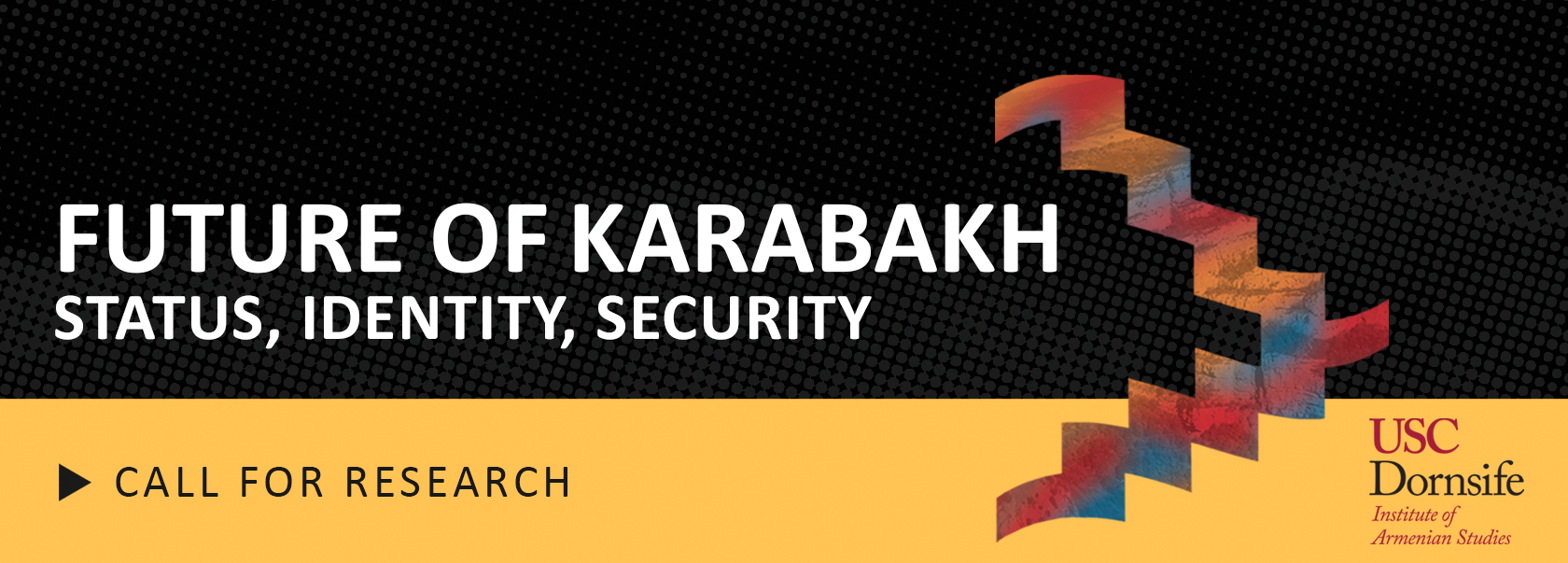
Application deadline: December 29, 2021
Grant award: $2,000-6,000
The 2020 Karabakh (Artsakh) War created new challenges and exacerbated unanswered questions about the future of regional relations and the status of Karabakh / Artsakh.
Following the Russia-brokered ceasefire of November 2020 that ended the second Karabakh War, and despite the presence of Russian peacekeepers on the ground, continuing military clashes on Karabakh’s borders and on Armenia’s borders, together with mass displacement and economic and physical insecurity, remain the dominant drivers of future scenarios.
As Armenians and Azerbaijanis reinforce their positions along newly created frontlines, explosions of violence have become commonplace. In the long-term, Armenia and Armenians will continue to find themselves affected by changes to the regional geopolitical environment: a victorious but still fiercely aggressive Azerbaijan, a Georgia that strives for neutrality but remains deeply entwined with, and economically dependent on Azerbaijan and Turkey, and Iran and Turkey each embroiled in massive domestic challenges.
The USC Institute of Armenian Studies grants will support original academic and policy research on the key issues that impact the future of the political entity that is Karabakh and its people, as well as the future of Armenia.
The Institute invites scholars (Ph.D. candidate and above) to apply for research grants that will address any aspect of the themes above or topics below. Grants will cover new and ongoing research such as dissertation research or postdoctoral research, and will be awarded in amounts of $2,000 to $6,000. Grantees conducting research in the region may be able to apply for a residency at the USC Tacori Center in Armenia.
Priority will be given to proposals on the following topics. Proposals to pursue other topics are also welcome.
Economic, Political, Social Development in Karabakh
- Legitimacy and viability of governmental institutions in de facto states
- Displacement and humanitarian crisis during and after the war
- Scenarios for economic revival
- Assessment of Armenia’s financial support to Karabakh
- Human security: Water, food, energy
View from Karabakh and Armenia: Political and Military Security
- Karabakh’s view of its own short and long-term security: Armenia’s role, Russia’s role
- Understanding post-war security and policy: Options for Armenia & Karabakh
- Assessment of Armenia’s regional diplomatic strategy: Georgia and Iran
- Approaches to Armenian military reform
- Post-war uncertainties: Issues of independence, autonomy, sovereignty for Armenia and Karabakh
- Understanding Armenia’s diplomatic agenda
- The role of legacy diaspora lobbying organizations in light of new realities
- The economic involvement of the Armenian diaspora in state-building
View From Russia
- Russian foreign policy with de facto states
- Prospects and questions regarding formal Russian integration of Karabakh
- Russian objectives in Karabakh, and the impact on Karabakh of changing political, economic, social scenarios inside Russia
- Russia-Azerbaijan relations, tensions, and cooperation
- Karabakh’s place in the Russia-US agenda, and the Russia-Turkey agenda
View From Azerbaijan
- Azerbaijan’s soft power and economic power in Georgia and Russia
- Internal political dynamics, governance, and decision-making processes in the context of Azerbaijani’s consolidated authoritarianism
- Extent and impact of Turkey’s integration in Azerbaijan’s institutions, especially the military and the media
View From the Region
- Armenia between Russian and Turkish global and regional interests
- Impact of Iran-Israel tensions on the region, post-war
- NATO-Turkey’s membership, Georgia’s aspirations, and consequences for the region
- Impact of demographic trends in the region
- Prospects of diplomacy and peacebuilding: Negotiation, compromise, region and neighborhood
- Dealing with climate change in a fractured region
- Psychological, conceptual consequences of the post-war trauma in Armenia, Karabakh, and Azerbaijan
- The role of media and education in developing national ideologies
- Human rights abuses and accountability
In addition, researchers are encouraged to address question from armeniacommission.org or any questions or issues discussed here.
Applications (in English) should consist of ONE MS Word or PDF document. They should include:
- A proposal of no more than 500-1000 words which outlines the rationale and plan of research, presents a clear research question, reviews previous research and theory that form the basis of the study, describes the research methodology, and summarizes what the research aims to uncover.
- A one-page detailed budget indicating the items for which the applicant is seeking funding. Grants are available for research expenses, such as the cost of hiring a research assistant or transcriber, computer software packages not typically provided by a college or university, and transportation, including travel to the region.
- A CV of no more than three pages.
Complete applications, in one document, should be sent to research.armenian@usc.edu by December 29, 2021.
Awards will be announced by January 14, 2022.
Grant recipients are expected to submit a 1,000 word progress report by June 30, 2022. The report should include:
Description of data / material collection process and outline of research methods
Timeline for completion of the project
Challenges and difficulties
Grant recipients are expected to complete and submit a 1,000 word FINAL report by November 30, 2022. The report should include:
Research-related challenges and difficulties
Conference / publication prospects
Submission of an article into a peer-reviewed journal
An article submitted to a newspaper or news site or to the USC Institute of Armenian Studies









